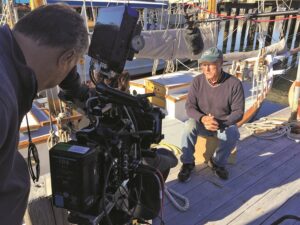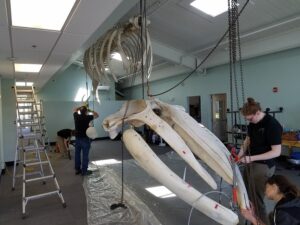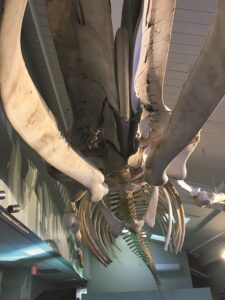Nadine Licostie has been in Provincetown long enough to know that scientific observation of its environment is just as much a part of life here as Carnival celebrations and the omnipresent silhouette of the Pilgrim Monument, if quieter and less visible.
Licostie is the executive director and producer of Spinnaker, a short documentary film that tells the story of the Center for Coastal Studies’ years-long, multipronged effort to free an endangered humpback whale named Spinnaker from a tangle of fishing lines. It will screen at Waters Edge Cinema on Saturday, April 22 as part of the April Environmental Film Series cosponsored by the CCS and the Provincetown Film Society. (Five other films are also included in the series, including Canadian filmmaker Nadine Pequeneza’s Last of the Right Whales —another documentary — on April 23.) The thirteen-and-a-half-minute Spinnaker, which was made in 2019, was recognized earlier this year at the second annual Anthem Awards in the sustainability, environment, and climate category.

Spinnaker opens with an unsettling scene of an inflatable boat rubbing against the colossal mass of the whale’s entangled body. The voice of Stormy Mayo, director of the CCS Right Whale Ecology Program, describes what we are looking at: a kind of “very slow death, the kind that we could call torture.”
The marine animal entanglement response team at CCS made three attempts to free Spinnaker over the course of 11 years before she died and beached on the shore of Maine’s Acadia National Park in 2015. At one point, Spinnaker became so enmeshed in a gillnet panel, which was hooked on 50 lobster trawls, that she was tethered to the sea floor by a length of rope. Her skeleton was recovered by CCS and is on display at the center’s Hiebert Marine Lab in Provincetown. (The film includes a time lapse sequence documenting the construction of the exhibition.)
The cinematography provides structure to a film that contains many startling facts — like the International Whaling Commission’s estimate that 300,000 whales, dolphins, and porpoises die annually from entanglements. Others sustain lifelong injuries: according to studies by CCS and the New England Aquarium, 83 percent of humpback whales between Cape Cod and Nova Scotia have scars from entanglements.

Licostie says that the CCS’s library of video footage was critical in making the film, as was working with the National Oceanic and Atmospheric Administration, which granted the necessary permits for filming on location.
For Licostie, who owns the Seaglass Inn and Spa in Provincetown with her wife, making the film was a way to shift people’s notions of what Provincetown is. “It was a great way to let people know that there’s more to Provincetown than what we hear about,” she said. “There are these amazing scientists here doing such pivotal work, and we recognized that the story of Spinnaker would be a really interesting way to learn more about people dedicating their lives — and in some cases even risking their lives — to do this work.”

The activist bent of the film is far from incidental. “I see documentary work as activism,” says Licostie. Besides Spinnaker, she has also made The Last One about the AIDS Memorial Quilt. Though each project is grounded in fact, Licostie says she made the films “through my own understanding of the world.”
